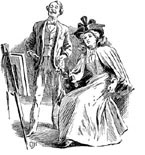
Confessions of a Patchwork Catholic
LEARNING HOW BIG CHRIST'S CHURCH IS
I am an anomaly. I am a Catholic, although it’s hard to say what kind of Catholic (as though there were different flavors, or something). Surely being Catholic is my defining characteristic. It has not influenced my life — it is my life. But I remain an anomaly. I am one of those kids born shortly after Vatican II. My road to and through Catholicism has been unusual, even extraordinary at times. But I believe my journey has made me all the richer, forcing me into a deeper love and understanding of a truly universal religion.
My parents were conscientious objectors of the religious, not political, sort. While other people’s folks were protesting Vietnam, my parents were protesting abuses that had crept into the American Catholic Church by the early 1970s — i.e., soon after Vatican II.
The documents of Vatican II were written in the form of pastoral letters. They were guidelines for creating what we would now call a more “user-friendly” Church, a Church where people would have more freedom and latitude in their expressions of faith. “Experimentation” became a buzzword, and the hope was that the immigrant-oriented prohibitions of the first half of the century would be replaced with an era of spiritual rebirth.
It didn’t work out that way.
Changes were implemented swiftly by those in authority at the local level. The laity found out quickly that “the people” were rarely to be consulted in this “people’s movement.” Some of my relatives were thrown out of their own parishes for voicing even small objections.
You May Also Enjoy
Return of the Festive Fire... Maus Trap... Burning Off the Big Macs... Tiny Treasure... Friendly Neighborhood Artwork... Four Score & One... and more
I enjoy what might be called “confessional tourism.” I’m fascinated by what confessors tell me, and so I tend to go to confession when I’m away from home.
Graham Greene?... Freedom for Cuba?... What About God?

